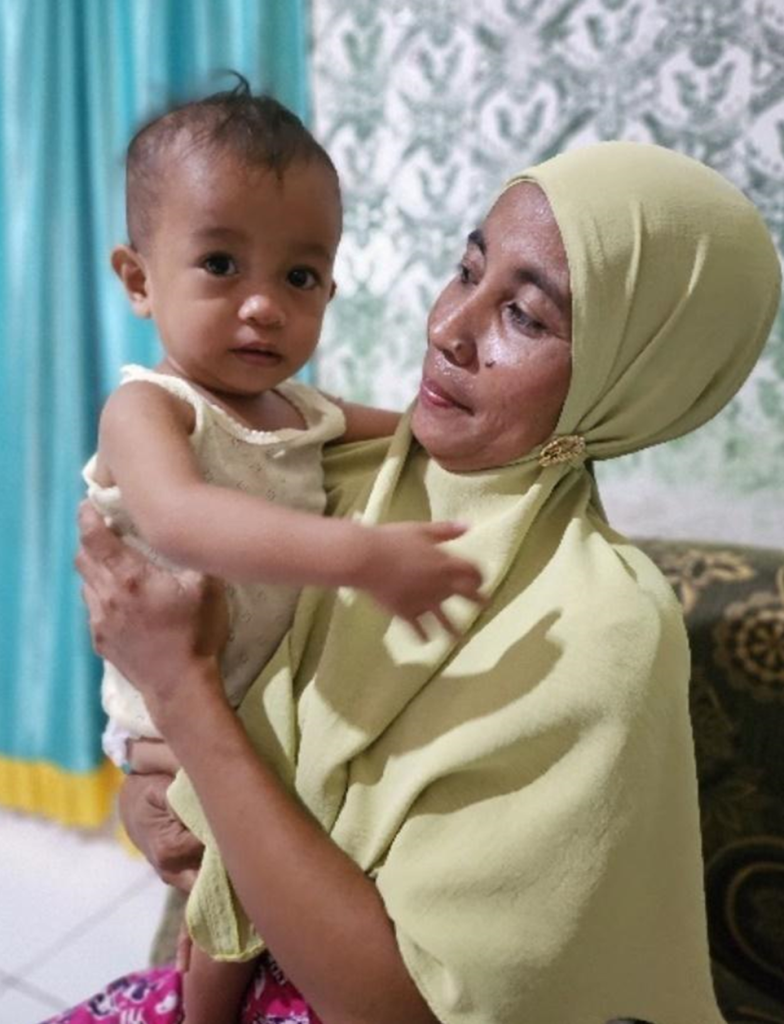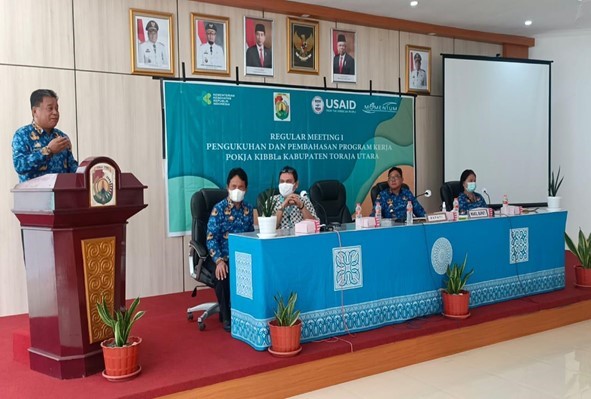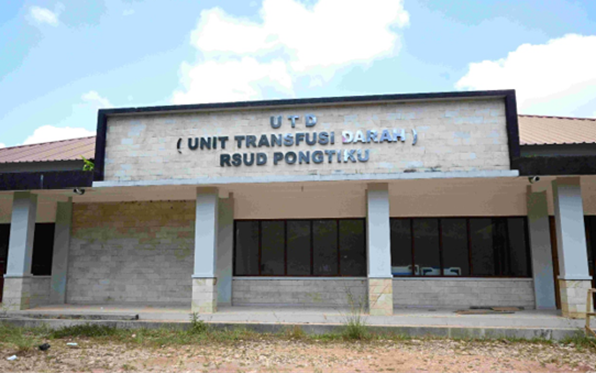Health is Everyone’s Business: MNCH Working Groups Reducing Maternal and Infant Deaths in Indonesia
Published on March 22, 2024
By Ester Lucia Hutabarat, Senior Communications Specialist, MOMENTUM Indonesia
Ratnawati’s Story

Ratnawati sailed through her previous pregnancies without a hitch. However, her fifth pregnancy proved to be challenging due to her being underweight and grand multipara. The term “grand multipara” refers to a woman who has experienced five or more pregnancies that resulted in live births. A grand multipara is at higher risk for various conditions such as anemia, hypertension, diabetes mellitus, and postpartum hemorrhage. Given this condition, Ratnawati faced increased risks for maternal and neonatal complications during her pregnancy. During one of her visits to the community health center in Taccorong Village, Bulukumba District, South Sulawesi in Indonesia, a vigilant midwife discovered that Ratnawati’s baby was in a breech position. As a result, she was referred to Bulukumba District General Hospital to consult with an obstetrician who recommended a c-section, leaving her anxious about the procedure.
“My family has no stable income. My husband doesn’t work due to his illnesses, and we had debts from insurance costs. We didn’t have the money to pay it off so we couldn’t use the insurance. How were we going to pay for the operation?” explained Ratnawati.
Ratnawati shared her concerns, including her financial worries, in a maternal health class at the village office, where BAZNAS, a local faith-based charity organization, provides supplementary meals for underweight pregnant women. A BAZNAS staffer, a member of the Maternal, Neonatal, and Child Health Working Group (MNCH Working Group), took this matter to one of their regular meetings, resulting in a recommendation to assist Ratnawati in accordance with their organization’s policies.
The MNCH Working Group in Indonesia is a collaborative, legal entity that brings together various stakeholders including government representatives, professional organizations, healthcare facilities and providers, non-governmental organizations, local communities, and the private sector, including private hospitals. The Working Group is formed at the provincial or district/city government level with the primary goal of monitoring and enhancing the quality of maternal and child health services, including care for pregnant women and newborns.
“Being part of the MNCH Working Group in Bulukumba District enables BAZNAS to allocate our support and assistance to the appropriate beneficiaries,” said Muh. Yusuf Shandy, Vice Chairman for Funding Distribution and Utilization of BAZNAS Bulukumba. BAZNAS stepped in to settle Ratnawati’s insurance debts and operation fees.
MOMENTUM’s support to MNCH Working Groups
USAID MOMENTUM Private Healthcare Delivery in Indonesia, which is enhancing access to and quality of maternal and child health services within healthcare facilities, supports the establishment or reinvigoration of MNCH Working Groups at the district and provincial levels. During the pandemic, many of the Working Groups had been nonfunctional when members were unable to regularly gather.
These multidisciplinary groups, with various stakeholders, play a leading role in achieving four key objectives:
- Efficiently allocating resources for healthcare infrastructure and staff to support pregnant women and newborns.
- Advocating for maternal and neonatal health at national and regional levels.
- Promoting research and innovation in healthcare practices and technologies.
- Serving as a central coordinating body in efforts to reduce maternal and neonatal mortality.
MOMENTUM supported the re-establishment of the Working Group in Bulukumba. The group includes participation from the private sector, private hospitals, related social organizations, and philanthropic organizations as members.
“The presence of the Working Group, with the active participation of several intergovernmental institutions and various stakeholders, is deemed crucial to reduce maternal and neonatal mortality, as the district health office can only provide 30% of the solution, relying on other entities for the remaining 70%,” said Rukiah, the Coordinator of Sub-division of Family Health and Nutrition with Bulukumba District Health Office.
Taking Action through MNCH Working Group in Bulukumba District
In Bulukumba, maternal and neonatal mortality is a pressing concern during childbirth and the first day of life. In 2022, the District Health Office data revealed nine maternal deaths, largely attributed to eclampsia, pre-eclampsia, and hemorrhage. Additionally, among 56 neonatal deaths, low birth weight and asphyxia were the leading causes.
Rukiah, who is also a member of the Maternal Perinatal Death Surveillance and Response (MPDSR) audit team in Bulukumba District, shared, “There is the need to shift from the old policy of single midwife-assisted deliveries to a multidisciplinary team-based approach involving general practitioners, midwives, and nurses. Moreover, it’s crucial for deliveries to occur in well-equipped healthcare facilities.”

Following the December 2022 maternal perinatal death audit, certain findings highlighted deficiencies such as insufficient skills among healthcare workers and a shortage of essential medications and tools at primary health facilities for maternal and newborn emergencies. In response to these findings, specific recommendations were put forth for Bulukumba District. These recommendations involve the implementation of emergency drills and the provision of training for managing emergencies at primary healthcare facilities. To implement these recommendations, the District Health Office was advised to conduct supportive supervision at community health centers to strengthen the skills and knowledge for Basic Emergency Obstetric and Newborn Care (BEmONC) by health workers. Yasira Hospital, the sole private hospital in Bulukumba and a member of the Working Group, shared the costs of these skill improvement efforts with the health office, exemplifying public-private coordination.
To fund recommendations such as those made for Bulukumba District, the Working Group supports advocacy efforts targeting related government institutions and village governments.
“As the Head of MNCH Working Group and Bulukumba District Development Planning, Research, and Development Agency, I have the authority to assist each district-level government institution and even village government in formulating their annual budgets, encouraging them to allocate funds for maternal neonatal health programs,” explained Syamsul Muhayat.
North Toraja District MNCH Working Group Established with MOMENTUM’s support

While MOMENTUM has helped reestablish some district working groups, it has also helped establish new ones such as the North Toraja District MNCH Working Group in 2022.
One of the significant achievements of the Working Group was successful advocacy for an increase in the allocated health budget in the district for 2023, surpassing the national requirement of 10% of the total budget. The Working Group has also forged partnerships with the private sector to support efforts to enhance maternal and newborn health, facilitating collaboration with the Yunus Kadir Foundation to provide its ambulance for transporting referred pregnant women or newborns.

The Working Group was also instrumental in expediting the establishment of a Blood Transfusion Unit. Originally planned for 2024, the establishment of the Blood Transfusion Unit in North Toraja District was brought forward to 2023 after a maternal death case occurred in 2022 due to postpartum hemorrhage. The death audit showed that the main cause was the lack of access and readiness for blood transfusion in the district.
Strengthening collaboration to reduce maternal and neonatal mortality
Dr. Andi Nurseha, the Head of the Division of Public Health with the South Sulawesi Provincial Health Office, emphasized the importance of MNCH Working Groups at both the district and provincial levels. These groups are essential to facilitate collaboration between the health office and various stakeholders in implementing programs aimed at reducing maternal and neonatal mortality.
“Health is everyone’s business. Different parties have their own duties and responsibilities, and accordingly contribute to our collective efforts towards reducing maternal and neonatal mortality,” she said.
She shared that the Working Groups, which are established with decrees from heads of districts or the governor, are official legal entities. The recommendations put forth by the Working Groups gain the legal foundation to compel relevant parties to enact them.
Ratnawati’s baby, named Azka, is now a healthy one-and-a-half-year-old with no significant health problems. While she may not have been aware of the Working Group’s involvement in the support she received from BAZNAS, she remains deeply grateful for the assistance provided to her and her baby.
“If it wasn’t for the help from BAZNAS, I don’t know what would happen with me and my baby. I hope such support will continue to reach others in need, just as it did for me and my family,” Ratnawati shared.

